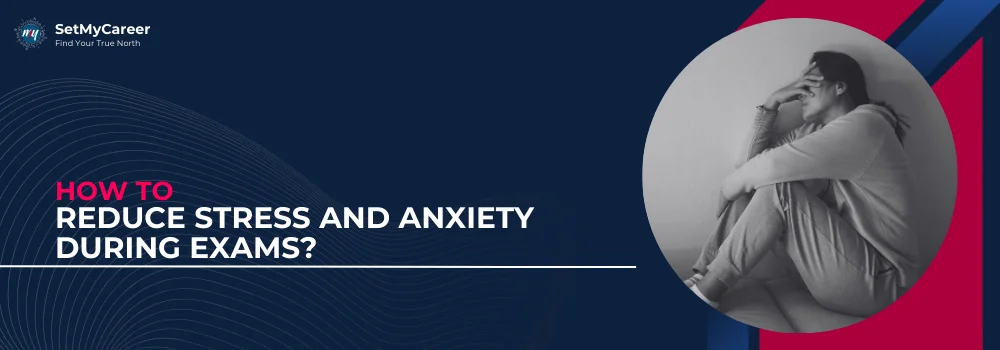Published by Jyothi Patil on 11 December 2024
Content Strategist | Editorial Team Member
Jyothi Patil is a skilled writer with a strong background in English literature, which she applies to crafting engaging content across various platforms. From writing blogs for her website and guest posts to creating pieces on Medium and Substack, Jyothi excels in making complex ideas easy to understand.
Discover how to reduce stress and anxiety during exams and boost your confidence with proven methods and relaxation techniques.

Exams can bring out the worst in many students—feelings of stress, anxiety, and fear of failure. You’re not alone if the thought of upcoming exams makes your heart race. In fact, it’s completely normal to feel anxious when you're under pressure. But what if you could manage those feelings and turn them into an advantage? In this blog, we’ll explore practical and science-backed techniques to reduce stress and anxiety during exams. From managing time effectively to incorporating relaxation exercises, you’ll learn strategies that can help you stay calm, focused, and perform your best.
Stress during exams is natural, often caused by pressure, fear of failure, and high expectations. Understanding how to cope with exam stress can help reduce anxiety and improve performance.
Fear of Failure: The pressure to do well can create a lot of stress. Many students feel that their future depends on these exams, which can lead to fear and doubt.
Time Pressure: Feeling like there’s not enough time to study can increase stress. The less time you think you have, the more anxious you become.
Perfectionism: Wanting perfect results can add to stress. When students set very high standards, even small mistakes can feel like big problems.
Lack of Preparation: If students feel unprepared, they may panic at the thought of struggling with questions. Procrastination or poor study habits can lead to this feeling of being unready.
By identifying the root causes of stress, students can better understand their feelings and take proactive steps to manage their anxiety.

With these tips, you'll feel more confident and in control
Ace Your ExamsOne of the biggest stressors students face is the overwhelming feeling of not having enough time to study. As time runs out, panic can take over. Effective time management for students can drastically show how to reduce exam stress and anxiety.
Create a Study Schedule: Break your revision into manageable chunks, assigning specific time blocks to different subjects. Use a study timetable to help you stay organized and focused.
Prioritize Tasks: Identify the most challenging topics and tackle them first. This allows you to address the hardest material when your energy is highest.
Mindfulness is a powerful tool to manage stress and anxiety, especially during exams. By focusing on the present moment, you can minimize distractions and calm your nervous system.
Breathing Exercises: Deep breathing can help slow your heart rate and relax your body. Try the 4-7-8 breathing technique: breathe in for 4 seconds, hold for 7 seconds, then exhale for 8 seconds.
Visualization: Imagine yourself walking into the exam room, calm and confident. Visualization helps to reduce fear and boost self-assurance.
It’s easy to skip meals or sacrifice sleep when you’re studying for exams, but this will only harm your performance.
Sleep: Lack of sleep increases cortisol (the stress hormone) and impairs memory and focus. Ensure you get 7-9 hours of sleep the night before your exam.
Healthy Snacks: A balanced diet with fruits, vegetables, and proteins keeps your energy steady and helps you how to increase concentration while studying. Avoid excess caffeine, which can raise anxiety, and opt for brain-boosting snacks like nuts or yogurt.
Your thoughts directly influence your emotional state, so replace negative self-talk with affirmations and positive reinforcement.
Challenge Negative Thoughts: Instead of thinking, “I can’t do this,” remind yourself, “I am prepared, and I can handle this challenge.”
Focus on the Effort, Not Perfection: Understand that exams are not about being perfect; they’re about doing your best. Embrace mistakes as part of the learning process.
Physical exercise is one of the most effective ways to reduce stress. It helps release endorphins, which improve mood and reduce anxiety.
Take Walks or Stretch: A quick walk or a session of light stretching can help you clear your mind and reset your focus.
Exercise Regularly: Regular physical activity throughout your study schedule will help you stay energized and less stressed.
Exam stress doesn’t have to take over your life. By incorporating effective time management, relaxation techniques, self-care practices, and a positive mindset, you can reduce anxiety and perform at your best. Remember, you’ve got this! If you need personalized career counselling for students or tips for exam preparation, reach out to SetMyCareer. We’re here to help you manage stress and succeed in your academic journey.
No. 14/595, 1st Floor, Nanjappa Reddy Layout, Koramangala 8th Block, Bangalore 560095